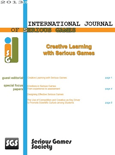
International Journal of Serious Games
Scope & Guideline
Unlocking the Power of Play for Meaningful Change
Introduction
Aims and Scopes
- Educational Applications of Serious Games:
The journal explores how serious games can be designed and implemented to serve educational purposes, enhancing learning outcomes in various fields such as STEM, language acquisition, and health education. - Cognitive and Psychological Impact:
Research often focuses on the cognitive effects of serious games, examining how they can influence learning processes, emotional responses, and motivational factors in players. - Game Design Methodologies:
The journal emphasizes the development and evaluation of serious game design methodologies, including participatory design approaches and frameworks for assessing educational quality. - Technology Integration in Serious Games:
There is a significant focus on the integration of emerging technologies, such as virtual reality and artificial intelligence, into serious games to enhance user experience and learning effectiveness. - Assessment and Analytics in Serious Games:
The publication includes studies on the assessment of serious games and the use of analytics to measure player engagement, learning outcomes, and cognitive performance.
Trending and Emerging
- Collaborative Learning in Serious Games:
Recent studies are increasingly focusing on the role of collaboration in serious games, exploring how multiplayer and cooperative gameplay can enhance learning experiences and outcomes. - AI and Machine Learning Integration:
The integration of artificial intelligence and machine learning into serious games is gaining attention, with research exploring how these technologies can personalize learning and adapt game experiences to individual players. - Health and Well-being Applications:
There is a growing trend towards serious games aimed at promoting health and well-being, with studies exploring their effectiveness in areas such as mental health, nutrition, and physical rehabilitation. - Data-Driven Game Design:
Emerging research emphasizes the use of data analytics to inform game design and improve player engagement, suggesting a shift towards more evidence-based approaches in serious game development. - Mixed Reality and Immersive Experiences:
The exploration of mixed reality applications in serious games is on the rise, highlighting the potential for immersive learning experiences that blend physical and digital environments.
Declining or Waning
- Traditional Game Formats:
Research on conventional game formats, such as board games, has decreased as the focus has shifted toward digital and interactive mediums, particularly in educational settings. - General Gamification Strategies:
While gamification remains relevant, there is less emphasis on generic gamification strategies without specific applications, as more targeted and context-specific approaches are gaining traction. - Single-Discipline Focus:
There has been a noticeable decline in studies focusing exclusively on singular disciplines, as interdisciplinary approaches that combine insights from various fields are becoming more prevalent. - Basic Game Mechanics Analysis:
Research analyzing basic game mechanics in isolation is less common, as there is a growing demand for studies that integrate complex interactions and their effects on learning outcomes. - Non-Educational Serious Games:
The journal is seeing less emphasis on serious games that do not have a clear educational or training component, reflecting a trend towards more purposeful game applications.
Similar Journals

Journal of Gaming and Virtual Worlds
Innovating the Landscape of Virtual Interactions.The Journal of Gaming and Virtual Worlds, published by INTELLECT LTD, serves as a pivotal platform for the exploration and dissemination of research in the rapidly evolving fields of gaming, virtual reality, and digital interactions. With an ISSN of 1757-191X and an E-ISSN of 1757-1928, this journal has established itself as a significant contributor to the landscape of computer graphics, computer science applications, and human-computer interaction within the UK and beyond. Operating from Bristol, England, the journal covers a spectrum of interdisciplinary topics that appeal to researchers, practitioners, and students alike, facilitating an enriched understanding of virtual technological advancements. The journal currently holds a Q3 ranking in both Computer Graphics and Computer-Aided Design and Computer Science Applications, as well as a Q4 ranking in Human-Computer Interaction, reflecting its commitment to high-quality scholarship. As it continues to publish pioneering research up to the year 2024, the Journal of Gaming and Virtual Worlds remains a valuable resource for those looking to stay at the forefront of the gaming and virtual environments domain.

Educar
Bridging Disciplines for a Better TomorrowEducar, published by the Universitat Autònoma de Barcelona, stands as a significant contributor to the fields of education, communication, and human-computer interaction. With an Open Access policy since 1982, this journal provides an invaluable platform for the dissemination of innovative research and insightful perspectives from diverse academic backgrounds. The journal boasts a commendable position in the 2023 category quartiles, ranking Q2 in Communication and Q3 in both Education and Human-Computer Interaction, which underscores its relevance and influence within these disciplines. Educar is indexed in Scopus and reflects a strong reception in the academic community, with its Social Sciences - Communication category ranked 173rd out of 511 journals, affirming its 66th percentile standing. Researchers and professionals will find this journal particularly useful for accessing a wide range of studies that not only push the boundaries of knowledge but also offer practical insights that enhance educational practices and technological engagement.

Computers
Empowering Scholars in Computer Networks and BeyondComputers is a leading journal published by MDPI, dedicated to advancing research in the fields of computer networks and communications, as well as human-computer interaction. Since its inception in 2012, it has established itself as a vital resource for scholars and practitioners, achieving an impressive Q2 ranking in Computer Networks and Communications and a Q3 ranking in Human-Computer Interaction as of 2023. The journal is indexed in Scopus, highlighting its relevance with a rank of #135/395 and #72/145 in their respective categories. Published in Switzerland, this open-access journal ensures widespread dissemination of research findings, supporting the global academic community in enhancing technologies relevant to computer science. Access options are available, fostering an environment where knowledge is shared freely. With an emphasis on innovation, redesign, and collaboration between humans and technology, Computers plays a crucial role in shaping the future of digital interactions.

Education and Training
Advancing educational excellence through research-driven insights.Education and Training is a leading peer-reviewed journal published by Emerald Group Publishing Ltd, dedicated to advancing the fields of education and professional development. With an impressive impact factor and recognized as a Q1 journal in both Business, Management, and Education, it serves as a crucial resource for researchers, educators, and practitioners. The journal's rich history, dating back to 1959, reflects its enduring commitment to delivering high-quality, research-driven insights that inform educational practices and management strategies. The Scopus rankings further affirm its significance in the academic community, showcasing its competitive position within the social sciences. Notably, the journal does not currently offer open access options, ensuring a curated audience of scholarly individuals who value rigorous academic contributions. By providing a platform for innovative research and thought leadership, Education and Training continues to shape the discourse on effective educational methodologies and enhance lifelong learning across various contexts.

Computers in Human Behavior Reports
Advancing the dialogue between technology and human behavior.Computers in Human Behavior Reports, published by ELSEVIER, is a distinguished open-access journal dedicated to advancing interdisciplinary research at the intersection of technology and human behavior. Since its inception in 2020, the journal has quickly gained a prominent position in the academic field, attaining Q1 category rankings in multiple areas including Applied Psychology, Artificial Intelligence, Cognitive Neuroscience, Human-Computer Interaction, and Neuroscience (miscellaneous). Its robust standing is evidenced by its exceptional Scopus ranks, particularly in Neuroscience—where it is positioned 4th out of 49 journals—demonstrating a high level of influence and engagement within the community. The journal's aim is to disseminate cutting-edge research findings and foster dialogue among researchers, professionals, and students alike, thereby addressing crucial questions regarding the impact of technology on human behavior and vice versa. As an open-access publication based in the United Kingdom, it not only enhances the visibility of research but also ensures wider accessibility to groundbreaking insights that shape our understanding of human-machine interactions.
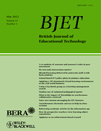
BRITISH JOURNAL OF EDUCATIONAL TECHNOLOGY
Advancing the Future of Learning through TechnologyBRITISH JOURNAL OF EDUCATIONAL TECHNOLOGY, published by Wiley, is a leading journal in the field of educational technology, recognized for its commitment to advancing research and practice in this dynamic arena. With an impressive impact factor that places it in the Q1 quartile for both Education and E-learning in 2023, it serves as a critical resource for academics, practitioners, and policymakers alike. This journal, with an established publication history since 1970, focuses on the integration of technology in educational settings, aiming to disseminate innovative findings and facilitate discussions that enhance learning experiences. Researchers contributing to the journal address diverse topics from digital learning environments to the pedagogical implications of emerging technologies, ensuring comprehensive coverage of the latest trends and methodologies. Submissions are welcomed in various formats, promoting collaborative scholarly dialogue in fostering effective educational practices. Access to the journal is available through traditional subscription frameworks, ensuring broad accessibility for institutions and individuals invested in the advancement of educational technology.
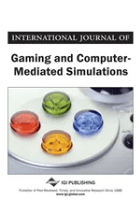
International Journal of Gaming and Computer-Mediated Simulations
Igniting Conversations on Computer-Mediated ExperiencesThe International Journal of Gaming and Computer-Mediated Simulations, published by IGI Global, serves as a pivotal platform for the dissemination of cutting-edge research in the realms of gaming and computer-mediated interactions. Established in 2009, it has consistently provided a scholarly space for innovative discussions around the implications, advancements, and societal impacts of gaming technologies and simulations. With an impressive impact factor as it continues to grow within the Q3 category of Computer Science Applications, this journal ranks #491 out of 817 in Scopus, highlighting its significance within an evolving discipline. Featuring contributions from both established and emerging scholars, the journal aims to bridge theoretical knowledge and practical application, thereby nourishing the academic pursuits of researchers, practitioners, and students alike. Access to the journal's rich content is critical for those striving to keep pace in this dynamic field, making it an essential resource for anyone invested in the future of gaming and computer-mediated environments.
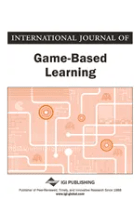
International Journal of Game-Based Learning
Innovative Strategies for Engaging Learning ExperiencesThe International Journal of Game-Based Learning serves as a vital platform for the exploration and dissemination of research focused on the intersection of gaming, education, and psychology. Published by IGI GLOBAL, a well-respected name in academic publishing, this journal seeks to provide valuable insights and innovative strategies that harness the educational potential of game-based learning. With a 2023 impact factor reflecting its growing influence—ranking in the Q3 category for Developmental and Educational Psychology and Education—this journal is essential for researchers and practitioners eager to bridge theory and practice through gamification. The journal is indexed in renowned databases such as Scopus, ranking in the 67th percentile for Social Sciences - Education and 51st percentile for Developmental and Educational Psychology, making it an anchor for scholarly contributions in these fields. By facilitating access to cutting-edge research, the International Journal of Game-Based Learning purports to redefine educational methodologies in an increasingly digital world.
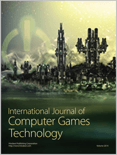
International Journal of Computer Games Technology
Bridging Academia and Practice in GamingInternational Journal of Computer Games Technology, an esteemed publication from HINDAWI LTD, serves as a pivotal platform for scholars and practitioners in the realms of computer graphics, software, and human-computer interaction. Since its inception in 2008 as an open-access journal, it has committed to disseminating cutting-edge research and innovative practices within the gaming technology sector. The journal, identified by its ISSN 1687-7047 and E-ISSN 1687-7055, is based in the United States and boasts a converged publication timeline from 2009 to 2024. Recognized in the 2023 Category Quartiles for its contributions to notable fields, it ranks Q3 in Computer Graphics and Computer-Aided Design, Q4 in Human-Computer Interaction, and Q3 in Software. With its active presence in Scopus rankings, the journal holds commendable positions in multiple categories, indicating a growing impact on the academic community. This journal not only aims to advance knowledge but also encourages collaborative exploration and innovative solutions, making it an essential resource for researchers, professionals, and students dedicated to the evolution of gaming technology.

JMIR Serious Games
Transforming Health Through Playful InnovationJMIR Serious Games is a leading open-access journal published by JMIR PUBLICATIONS, INC, dedicated to disseminating high-quality research in the emerging field of serious games for health. Since its establishment in 2013, the journal has positioned itself at the forefront of innovative strategies using game technology to improve health outcomes, rehabilitation, and mental health treatment. With a commendable impact factor and a prestigious Q1 ranking in Biomedical Engineering, Physical Therapy, and Rehabilitation for 2023, JMIR Serious Games stands out as a crucial resource for professionals and researchers aiming to explore the intersection of gaming and health sciences. The journal fosters a collaborative environment that encourages the sharing of cutting-edge research findings and applications, making it an essential reference for academics, practitioners, and students interested in harnessing the potential of serious games to transform healthcare practices.